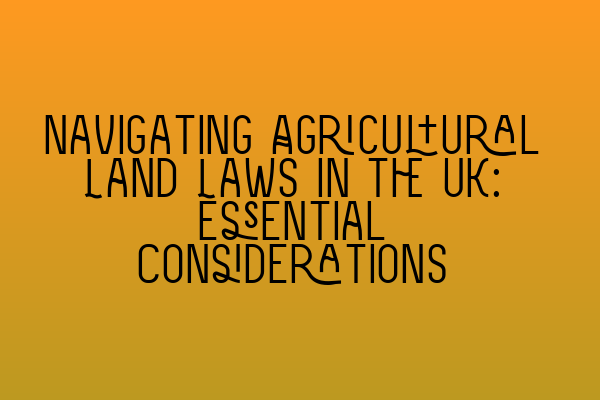Navigating Agricultural Land Laws in the UK: Essential Considerations
When it comes to agricultural land in the UK, navigating the complex web of laws and regulations can be a daunting task. Whether you are a farmer, landowner, or an investor in the agricultural sector, understanding the legal framework is essential for making informed decisions and avoiding potential pitfalls. In this article, we will explore the key considerations when dealing with agricultural land laws in the UK.
Ownership and Tenure
One of the first and most crucial aspects to consider is the ownership and tenure of agricultural land. In the UK, agricultural land can be owned by individuals, partnerships, or companies. It is important to establish the legal status and ownership of the land before entering into any transactions or agreements. Working with a qualified solicitor who specializes in agricultural property law, such as SQE Property Law & Land Law, can ensure that all legal requirements are met.
Understanding the tenure of agricultural land is also essential. In the UK, the most common form of agricultural land tenure is a farm tenancy. Farm tenancies can be governed by various types of agreements, including Agricultural Holdings Act tenancies, Farm Business Tenancies, and Grazing Licenses. Each type of tenancy has its own rules and regulations that both landlords and tenants must adhere to.
To explore this topic further, check out our article on SQE 1 Practice Exam Questions.
Planning and Development
Planning regulations play a vital role in agricultural land use. If you are considering developing agricultural land for non-agricultural purposes, obtaining planning permission is necessary. It is important to be aware of the restrictions and requirements set out by local authorities in relation to agricultural land use and development.
Furthermore, certain classifications of agricultural land, known as Green Belt land, enjoy additional protection under UK planning law. Green Belt land is designated to prevent urban sprawl and maintain the openness of the countryside. Development on Green Belt land is generally restricted, and obtaining planning permission can be more challenging.
For comprehensive preparation on planning and development laws relevant to agricultural land, you can enroll in our SQE 2 Preparation Courses.
Environmental Considerations
Agricultural land is subject to various environmental regulations and considerations. The UK has implemented numerous environmental policies aimed at protecting the environment and promoting sustainable agricultural practices.
One key area to consider is the Basic Payment Scheme (BPS), which provides financial support to farmers who meet certain environmental standards. Compliance with environmental regulations, such as cross-compliance requirements, is essential for eligibility to receive BPS payments.
Preserving biodiversity, managing water resources, and mitigating climate change are other critical aspects associated with agricultural land. Familiarizing yourself with the UK’s environmental policies and seeking professional advice can help ensure that your agricultural activities are environmentally sustainable.
For more information on environmental considerations in agricultural land management, take a look at our article on SQE 1 Practice Mocks FLK1 FLK2.
Taxation and Succession Planning
Taxation is an important consideration for anyone involved in agricultural land transactions or ownership. Understanding the tax implications of buying, selling, or inheriting agricultural land is crucial for effective financial planning.
In addition, succession planning is vital for the long-term sustainability of agricultural businesses. Succession planning involves transferring the ownership and management of agricultural land and assets to the next generation. It is important to structure any succession plans carefully to minimize tax liabilities and ensure a smooth transfer of assets.
For detailed guidance on taxation and succession planning in the context of agricultural land, you can explore our SQE 1 Preparation Courses.
Conclusion
Navigating agricultural land laws in the UK requires a thorough understanding of the legal framework and its practical implications. By considering ownership and tenure, planning and development, environmental considerations, and taxation and succession planning, you can make informed decisions when dealing with agricultural land.
At SQE Property Law & Land Law, we specialize in agricultural property law and offer comprehensive legal services tailored to the unique needs of our clients. Contact us today to discuss how we can assist you in navigating agricultural land laws in the UK.
For more information on SRA SQE exam dates and preparation, visit our article on SRA SQE Exam Dates.
